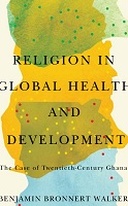Explore

Religion in Global Health and Development
0 Ungluers have
Faved this Work
Login to Fave
The COVID-19 pandemic has made evident that the field of global health – its practices, norms, and failures – has the power to shape the lives of billions. Global health perspectives on the role of religion, however, are strikingly limited. Uncovering the points where religion and global health have connected across the twentieth century, focusing on Ghana, provides an opportunity to challenge narrow approaches. In Religion in Global Health and Development Benjamin Walker shows that the religious features of colonial state architecture were still operating by the turn of the twenty-first century. Walker surveys the establishment of colonial development projects in the twentieth century, with a focus on the period between 1940 and 1990. Crossing the colonial-postcolonial divide, analyzing local contexts in conjunction with the many layers of international organizations, and identifying surprisingly neglected streams of personnel and funding (particularly from Dutch and West German Catholics), this in-depth history offers new ways of conceptualizing global health. Patchworks of international humanitarian intervention, fragmented government services, local communities, and the actions of many foreign powers combined to create health services and the state in Ghana. Religion in Global Health and Development shows that religion and religious actors were critical to this process – socially, culturally, and politically.
This book is included in DOAB.
Why read this book? Have your say.
You must be logged in to comment.
Rights Information
Are you the author or publisher of this work? If so, you can claim it as yours by registering as an Unglue.it rights holder.Downloads
This work has been downloaded 56 times via unglue.it ebook links.
- 56 - pdf (CC BY-NC-ND) at OAPEN Library.
Keywords
- christianity
- Ghana
- History
- Humanities
- medicine
- World Health
Editions

